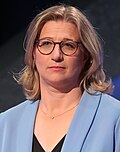The following is a list of heads of government of the sixteen states of Germany.
Contents

| State | Portrait | Head of government [a] Date of birth | Party | Took office | Time in office | Election(s) | Current cabinet | |
|---|---|---|---|---|---|---|---|---|
| Baden-Württemberg |  | Winfried Kretschmann 17 May 1948 | Greens | 12 May 2011 | 14 years, 174 days | 2021 2016 2011 | Kretschmann III | |
| Bavaria |  | Markus Söder 5 January 1967 | CSU | 16 March 2018 | 7 years, 231 days | 2023 2018 | Söder III | |
| Berlin |  | Governing Mayor Kai Wegner 15 September 1972 | CDU | 27 April 2023 | 2 years, 189 days | 2023 | Wegner | |
| Brandenburg |  | Dietmar Woidke 22 October 1961 | SPD | 28 August 2013 | 12 years, 66 days | 2024 2019 2014 | Woidke IV | |
| Bremen |  | President of the Senate and Mayor Andreas Bovenschulte 11 August 1965 | SPD | 15 August 2019 | 6 years, 79 days | 2023 2019 | Bovenschulte II | |
| Hamburg |  | First Mayor Peter Tschentscher 20 January 1966 | SPD | 28 March 2018 | 7 years, 219 days | 2025 2020 | Tschentscher III | |
| Hesse |  | Boris Rhein 2 January 1972 | CDU | 31 May 2022 | 3 years, 155 days | 2023 | Rhein II | |
| Lower Saxony |  | Olaf Lies 8 May 1967 | SPD | 20 May 2025 | 166 days | 2022 | Lies | |
| Mecklenburg-Vorpommern |  | Manuela Schwesig 23 May 1974 | SPD | 4 July 2017 | 8 years, 121 days | 2021 | Schwesig II | |
| North Rhine-Westphalia |  | Hendrik Wüst 19 July 1975 | CDU | 27 October 2021 | 4 years, 6 days | 2022 | Wüst II | |
| Rhineland-Palatinate |  | Alexander Schweitzer 17 September 1973 | SPD | 10 July 2024 | 1 year, 115 days | 2021 | Schweitzer | |
| Saarland |  | Anke Rehlinger 6 April 1976 | SPD | 25 April 2022 | 3 years, 191 days | 2022 | Rehlinger | |
| Saxony |  | Michael Kretschmer 7 May 1975 | CDU | 13 December 2017 | 7 years, 324 days | 2024 2019 | Kretschmer III | |
| Saxony-Anhalt |  | Reiner Haseloff 19 February 1954 | CDU | 19 April 2011 | 14 years, 197 days | 2021 2016 2011 | Haseloff III | |
| Schleswig-Holstein |  | Daniel Günther 24 July 1973 | CDU | 28 June 2017 | 8 years, 127 days | 2022 2017 | Günther II | |
| Thuringia |  | Mario Voigt 8 February 1977 | CDU | 12 December 2024 | 325 days | 2024 | Voigt | |